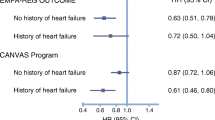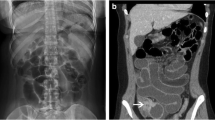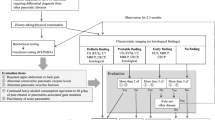Abstract
While the effects of transient intestinal ischemia on mucosa have been well investigated, less is known about its effect on motor function. An experimental study was designed to investigate the effects of ischemia–reperfusion (I/R) on intestinal motility and intestinal muscular microcirculation. Wistar albino rats were divided into four groups: (1) baseline, (2) sham operation, (3) I/R, and (4) I/R with allopurinol pretreatment. Ischemia was induced by clamping the superior mesenteric artery (SMA) for 10 min. Gastroanal transit time (GATT) was measured with serial x-rays after instillation of barium sulfate to the stomach. Intestinal muscular microcirculation was evaluated by determining the number of carbon-perfused intestinal muscular microvessels (CPIMM). I/R prolonged GATT and decreased CPIMM significantly (P < 0.01). Pretreatment with allopurinol prevented prolongation of GATT and returned the number of CPIMM to the level of sham treatment (P < 0.01). In conclusion, reperfusion after 10 min of SMA ischemia alters intestinal motility. The no-reflow phenomenon plays an important role in this alteration of motility. Administration of allopurinol before reperfusion preserves intestinal motility by preventing the occurrence of no-reflow phenomenon.
Similar content being viewed by others
REFERENCES
Montgomery RA, Venbrux AC, Bulkley GB: Mesenteric vascular insufficiency. Curr Probl Surg 34:945–1025, 1997
Turnage RH, Kadesky KM, Myers SI, Guice KS, Oldham KT: Hepatic hypoperfusion after intestinal reperfusion. Surgery 119:151–160, 1996
Langer JC, Sohal SS, Increased mucosal permeability after intestinal ischemia-reperfusion injury is mediated by local tissue factors. J Pediatr Surg 27:329–331, 1992
Langer JC, Sohal SS, and Mumford DA. Mucosal permeability in the immature rat intestine: Effects of ischemia–reperfusion, cold stress, hypoxia, and drugs. J Pediatr Surg 28:1380–1383, 1993
Langer JC, Sohal SS, and Marshall J. Histamine does not mediate mucosal permeability changes after subclinical intestinal ischemia–reperfusion injury. J Pediatr Surg 28:1113–1116, 1993
Langer JC, Sohal SS, and Riddell RH. Mucosal permeability to 51Cr EDTA following subclinical intestinal ischemia–reperfusion injury in the weanling rat. J Pediatr Surg 28:601–605, 1993
Langer JC, Sohal SS, and Blennerhasset P. Mucosal permeability after subclinical intestinal ischemia-reperfusion injury: An exploration of possible mechanisms. J Pediatr Surg 30:568–572, 1995
Okur H, Küçükaydín, M, Köse K, Konta? O, Do?an, P, and Kazez A. Hypoxia-induced necrotizing enterocolitis in the immature rat: The role of lipid peroxidation and management by vitamin E. J Pediatr Surg 30:1416–1419, 1995
Kazez A, Küçükaydín N, Küçükaydín M, Konta? O, Okur H, and Do?an P. A model of hypoxia-induced necrotizing enterocolitis: The role of distention. J Pediatr Surg 10:1466–1469, 1997
Sava? ç, Aras T, çakmak M, Bilgehan A, Atao?lu Ö, Türközkan N, Özgüner F, Yücesan S, and Dindar H. Pentoxifylline inhibits overflow and reduces intestinal reperfusion injury. J Pediatr Surg 32:905–910, 1997
Menger MD, Rücker M, and Vollmar B. Capillary dysfunction in striated muscle ischemia/reperfusion: On the mechanisms of capillary “no-reflow,” Shock 8:2–7, 1997
Barroso-Aranda J, Schimid-Schöbein GW, Zweifach BW, and Engler RL. Granulocytes and no-reflow phenomenon in irreversible hemorrhagic shock. Circ Res 63:437–447, 1988
Jerome SN, Smith CWB, and Korthuis RJ CD 18-dependent adherence reactions play an important role in the development of the no-reflow phenomenon. Am J Physiol 33:H479–H483, 1993
Hebra A, Brown MF, McGeehin K, Braussard D, and Ross, AJ III: The effects of ischemia and reperfusion on intestinal motility. J Pediatr Surg 28:362–366, 1993
Hebra A, Hong J, McGowan KL, Smith C, McKernan, M. L, and Ross AJ III. Bacterial translocation in mesenteric ischemia-reperfusion injury: Is dysfunctional motility the link. J Pediatr Surg 29:280–287, 1994
Bielefeldt K., Conklin JL. Intestinal motility during hypoxia and reoxygenation in vitro. Dig Dis Sci 42:878–884, 1997
Udassin R, Eimerl D, Schiffman J, and Haskel Y. Postischemic intestinal motility in rat is inversly correlated to length of ischemia. An in vivo animal model. Dig Dis Sci 40:1035–1038, 1995
Summers ST, Zinner MJ, Freischlag JA: Production of endothelium derived relaxing factor (EDRF) is compromised after ischemia and reperfusion. Am J Surg 166:216–222, 1993
Davies MG, Hagen PO: The vascular endothelium: A new horizon. Ann Surg 218:593–609, 1993
Kaminski PM, Proctor KG. Attenuation of no-reflow phenomenon, neutrophil activation, and reperfusion injury in intestinal microcirculation by topical adenosine. Circ Res 65:426–435, 1989
Canada AT, Coleman LR, Fabian MA, and Bollinger R. R. Adenine nucleotides of ischemic intestine do not reflect injury. J Surg Res 55:416–421, 1993
Boros M, Kaszaki J, Ördögh B, and Nagy S. Intramucosal pH changes following complete segmental small intestinal ischemia, as compared with the effects of superior mesenteric artery occlusion. Eur Surg Res 26:76–86, 1994
Turnage RH, Kadesky KM, Bartula L, Guice KS, Oldham KT, and Myers SI. Splanchnic PGI2 release and “no-reflow” following intestinal reperfusion. J Surg Res 58:558–564, 1995
Akgür FM, Olguner M, Yenici O, Gökden M, Aktu? T, Yílmaz M, and Ataç G. The effects of allopurinol pretreatment on intestinal hypoperfusion encountered after correction of intestinal volvulus. J Pediatr Surg 31:1205–1207, 1996
Alican I, Ye?en C, Olcay A, Kurtel H, and Ye?en B: Ischemiareperfusion-induced delay in intestinal transit. Role of endothelins. Digestion 59:343–348, 1998
Author information
Authors and Affiliations
Rights and permissions
About this article
Cite this article
Hakgüder, G., Akgür, F.M., Ateş, O. et al. Short-Term Intestinal Ischemia–Reperfusion Alters Intestinal Motility That Can Be Preserved by Xanthine Oxidase Inhibition. Dig Dis Sci 47, 1279–1283 (2002). https://doi.org/10.1023/A:1015314312730
Issue Date:
DOI: https://doi.org/10.1023/A:1015314312730




